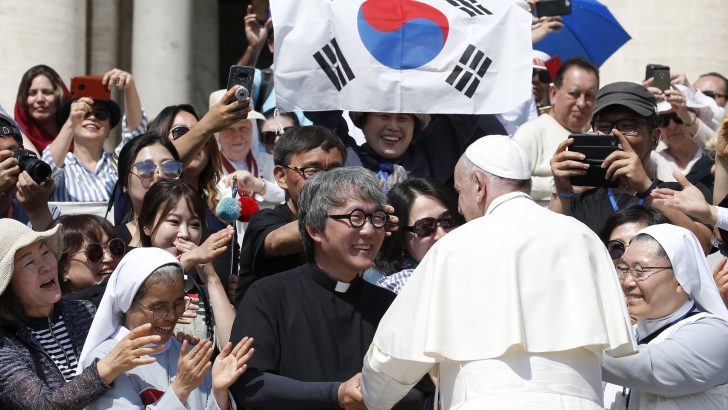As neighbouring countries try to mediate an ongoing trade war between Japan and South Korea, one bishop has stepped into the ring urging both sides to “rational dialogue” in solving their problems without further escalation.
Bishop Taiji Katsuya of Sapporo, president of the Japan Catholic Council for Justice and Peace, issued a statement earlier this month in both Japanese and Korean titled ‘Toward Reconciliation of the Japan-Korea Governments’ Relationship’.
In the statement, portions of which were translated into English by ucanews.com, Bishop Katsuya urged political leaders in both nations to calm tensions and approach their current conflict with calmness and rationality.
“Regardless of policies, Japan and Korea should be important neighbours, and politicians must not damage the people’s friendship by acting rashly,” he said.
Resentment
The current tensions between the two Asian nations are centred around lingering resentment among Koreans over Japan’s actions during its occupation of the Korean Peninsula from 1910-1945.
Fresh conflict between Seoul and Tokyo was sparked in October 2018 when South Korea’s Supreme Court ruled that Japanese companies must pay reparation to Korean workers sentenced to forced labour during the Japanese occupation.
Claims
Japan has resisted the move, insisting a 1965 treaty signed by both countries had definitively resolved all claims, with Japan paying Korea some $800m (€721m) in grants and loans. As far as individual claims, Japan holds that cases such as forced labour ought to be taken care of by the Korean government, since it took the money.
However, the Korean position is that while the treaty settled government claims, it did not cover those involving individuals and companies.
On July 4, Japan cracked down on export procedures for materials used in high-tech products shipped to Korea. On August 2, the Japanese government announced plans to drop Korea from its list of Group A countries that are granted preferential trade status.
Seoul retaliated, announcing that it was also removing Japan from its list of countries holding preferential trade status.
This spat over export controls will reportedly be a key item during a meeting with the foreign ministers of all three nations in Beijing”
According to the South China Morning Post, amid the escalating tensions between Japan and Korea, China, currently wading through its own trade war with the United States, has sought to draw on its regional influence to play mediator in the escalating dispute.
This spat over export controls will reportedly be a key item during a meeting with the foreign ministers of all three nations in Beijing.
Both Japanese and South Korean leaders have expressed a willingness to discuss the issue. In a speech last week marking the 74th anniversary of the end of World War II, South Korean President Moon Jae-in called for talks with Tokyo. Japan has expressed openness, but without third-party intervention.
Meetings
During their meetings in Beijing last week, Japanese Foreign Minister Taro Kono and his South Korean counterpart Kang Kyung-wha will hold a separate one-on-one meeting to discuss the issue, according to the Nikkei Asian Review news site.
In his statement, Katsuya appeared sympathetic to the position that Japan ought to pay up, noting that several Japanese lawyers and scholars have spoken out on the issue, saying Japan’s response to the current dispute “is not appropriate”.
“Both the Japanese and Korean governments and Japan’s Supreme Court agree that the nation’s right to claim compensation was settled by the agreement, but it has been pointed out that the right of individuals to claim compensation is still unresolved,” the bishop said.
Bishop Katsuya noted that “Japanese media widely report what the Japanese government says but ignore what the Korean side is saying. Therefore, it seems that Japanese society is tending toward criticism of the Korean government.”
He insisted that current tensions, including the boycotting of products and the cancellation of long-standing exchange programs between the two countries “is deeply connected to unresolved issues regarding Japan’s colonial rule over the Korean Peninsula and its liquidation process”.
“I think that we should pay attention to this,” he said, urging the Japanese government to give “special consideration” to its former colonial countries.
“There is no other way to solve the issue than a calm and rational dialogue with mutual respect,” he said.
In his own statement, Bishop Bae Hyun, Chairman of the Justice and Peace Committee of the Korean Catholic Bishops’ Conference, said that he is “worried about the people” and what impact current tensions might have on them.
Today, human history calls for a win-win path through dialogue and cooperation, not confrontation between neighbours”
He called Japanese sanctions against Koreans, “who have walked in the dark over the past 35 years and who have lost their language, their country, and even customs”, a “new violence” coinciding with a year that marks not only the 74th anniversary of Korea’s liberation from Japan, but the 100th anniversary of the establishment of the Korean Provisional Government.
Bishop Hyun said Catholic churches in Korea have welcomed an invitation from Katsuya and the Japanese bishops to pray together “in solidarity with brotherly love” for an end to the current crisis.
“Today, human history calls for a win-win path through dialogue and cooperation, not confrontation between neighbours,” he said, insisting that both sides are tasked with pursuing both unification and peace, as well as the “realisation of universal values for humanity”.
“In Korea-Japan relations, we must find the right way to meet the new order, the way of truth and freedom, justice and love,” Bishop Hyun said, asking Our Lady of Peace to have mercy “on those who have shed blood and died for the independence of their country against the colonial rule of Japan 100 years ago”, and urged Koreans to forgive.
Elise Harris is Senior Correspondent of Cruxnow.com


 Pope Francis meets pilgrims from South Korea during his general audience in St Peter’s Square at the Vatican. Photo: CNS
Pope Francis meets pilgrims from South Korea during his general audience in St Peter’s Square at the Vatican. Photo: CNS 